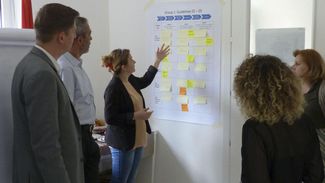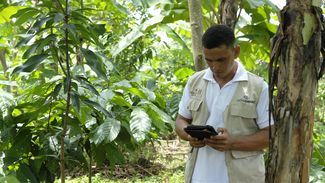
Regular results measurement and continuous monitoring are crucial quality assurance tools for Swisscontact. They allow the projects to be managed in such a way that they have the greatest possible impact on the beneficiaries. They are also useful in internal learning processes and for documentation of individual projects as well as for the organisation as a whole. Since 2013, Swisscontact has been investing significant resources to create a unified monitoring and results measurement system for use in all our projects, meeting the internationally recognised standards of the Donor Committee for Enterprise Development (DCED).
In 2018, we completed the upgrade of our internal project monitoring and results measurement guideline, now available in three languages (English, French, and Spanish) for our projects worldwide. For quality assurance, projects are supported by regional advisors to implement the guidelines. Internal advanced training seminars conducted in 2018 addressed the topics of quality in reporting, cost-benefit analyses, and the increasing use of digital applications in results measurement. To ensure further information sharing beyond individual projects, in 2018 a Community of Practice (CoP) was founded. This is a virtual platform on which Swisscontact experts from all global regions equip their colleagues with valuable results measurement tools and are also available to provide guidance and tips.
The advantages of systemic results measurement were illustrated in an explainer video based on a practical example in 2018. The video shows how solid quantitative data and qualitative assessments can ensure that project resources are implemented reasonably, and it also shows how Swisscontact’s solutions can be improved and replicated for use by additional beneficiaries.

Digitalisation is also making its way into international development cooperation. It is precisely with results measurement where digital applications exhibit special advantages and are replacing pen and paper, even in remote areas.
In international development cooperations, data is collected often directly from SMEs and farmers benefiting either directly or indirectly from a project. Those surveyed often live in small, remote villages with poor infrastructure. A long time may pass before the completed questionnaires make their way back to the project office and are entered into a database.
Thanks to digitalisation, this process can be accelerated significantly. Swisscontact equips its interviewers in many projects with tablets. They use them to fill out questionnaires from their beneficiaries directly on the spot, and this is possible to do offline in more remote areas. As soon as there is an internet connection, the data is uploaded, available, and ready for assessment. The expensive and long process of data entry is bypassed, thus also avoiding a large source of errors. The tablets pay for themselves quickly through these savings.
Improved data quality, along with the accelerated process and cost savings, constitute one further advantage in digital data collection. The questionnaire can be programmed in such a way that the interviewer cannot skip any questions, while slips of the pen can be avoided. GPS helps to identify where the data was gathered and how long the interview lasted. Direct data uploads to the cloud enable immediate feedback on data quality.
The functionality of a digital solution represents a further advantage over data collection with pen and paper. The GPS function allows for geodata to be easily collected, depicted, and analysed. Moreover, photos, audio, or video files can be incorporated into the questionnaire for further analysis.
Mobile data collection is particularly useful in regular quantitative data assessment, resulting in improved digital traceability of the numbers gathered. This also has positive implications for transparency in reporting in projects in terms of results measurement. Thanks to geodata, results also can be compared historically and rendered plausible.
Swisscontact
Swiss Foundation for Technical Cooperation
Hardturmstrasse 123
CH-8005 Zurich
Tel. +41 44 454 17 17
Fax +41 44 454 17 97
E-Mail info@swisscontact.org